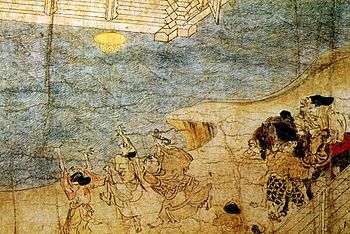Shigisan-engi

Shigisan-engi (信貴山縁起, lit. "Legend of Mount Shigi") is an emakimono or painted handscroll made in the early 12th century. The story details miracles which were attributed to the Shingon monk Myoren, who lived on Mount Shigi near Nara in Japan in the latter part of the 9th century.[1]
The tales are composed in the genre of engi. Engi is a narrative that chronicles the founding of a Buddhist establishment which, in the case of the Shigisan engi, is Chogosonshi-ji, founded by Myoren. The tales are painted in a style called otoko-e, or "men's pictures", a style characterized by active movement, outdoor scenes and a certain feeling of lacking restraint.
The work is also a prime example of Heian scroll painting. As a work that draws from classical Japanese culture, it is referred to as yamato-e (as opposed to the Chinese themes inherent in kara-e.)
References
| Wikimedia Commons has media related to Shigisan Engi Emaki. |
- ↑ "Shigisan engi emaki". Encyclopædia Britannica. Retrieved 2009-01-22.